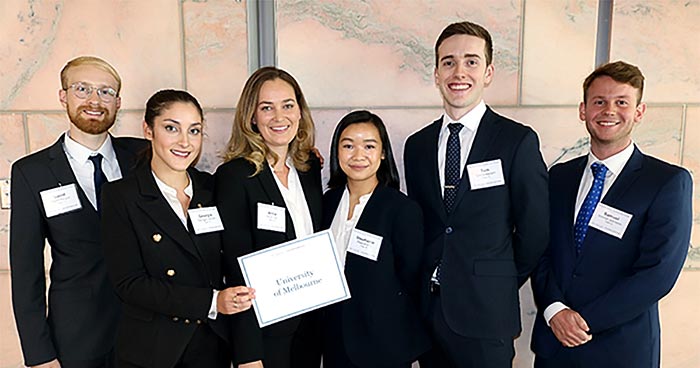Reflections on the Emory Global Health Case Competition
This year a team of six University of Melbourne students won the Emory Global Health Case Competition (GHCC) in Atlanta, for the first time since the University began competing in 2014. For civil engineering student Tom Strawhorn, the experience affirmed how his skills in problem-solving can be applied beyond the field of engineering.

I first heard about the Global Health Case Competition through a friend. I was a bit hesitant to get involved because it was a discipline I knew little about and wasn’t sure how my engineering skillset would apply to the case.
However, global health is something that I find very interesting and it looked like a great opportunity to broaden my knowledge and skillset whilst meeting some really interesting and smart people.
Global health is something that I find very interesting and it looked like a great opportunity to broaden my knowledge and skillset whilst meeting some really interesting and smart people
The first stage of this competition was an intramural GHCC, where five University of Melbourne teams competed against each other over a month. Our task was to provide a recommendation to the Indian Government to combat the rising issue of obstetric fistulas, a complication of childbirth.
This was a very challenging case for me as I had no content knowledge whatsoever. Luckily, I was fortunate to be placed in an outstanding team which had incredible knowledge and insight into the case.
I was able to help by applying a structured and formalised approach to the solution and the presentation. Under tough competition, my team were lucky enough to win the University of Melbourne competition, and I was selected to represent the University at the International Emory GHCC in Atlanta, Georgia.
The Emory case involved developing an improved hurricane preparedness plan for a country critically exposed to hurricanes, with a focus on public health outcomes. We chose to review and recommend improvements for the Dominican Republic and competed with five other universities doing the same case.
Again, this was a case I felt I had little standing on; however, many of my teammates and other competitors were in a similar boat – this was not a typical public health case.
As we developed our insights and recommendations for the case, I leant on my incredible teammates for contextual public health insights, recommendations and interventions.
I was able to help through structured thought and problem definition, which enabled my teammates to solve the most important problems.
My engineering mindset also helped me with the implementation staging of our solution, the finances and the development of a risk model for all of the implications of hurricanes. Together, this gave us the opportunity to prioritise and target the most important aspects of the case.
Just because I’m an engineer, I’m not limited by technical problems in my discipline. The frameworks, results-oriented problem solving and quantitative skills that I’ve learnt through studying engineering can be applied to everything
Combining our different approaches and skillsets, we went on to win the case competition, as well as the people’s choice award.
We were all very surprised and grateful to be awarded first place and thankful to be selected to represent the University overseas in this competition.
The competition really helped me understand how I can take my skillset and integrate it and apply it to different things.
Just because I’m an engineer, I’m not limited by technical problems in my discipline. The frameworks, results-oriented problem solving and quantitative skills that I’ve learnt through studying engineering can be applied to everything.
Ready to test your skills beyond the field of engineering? Register for the 2019 Information Session on Monday 12 August at 5:00pm and apply to be part of the next Global Health Case Competition by Friday 30 August.
Related topics